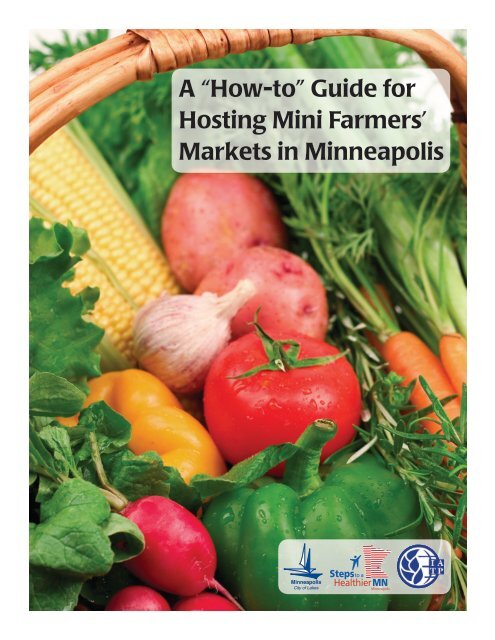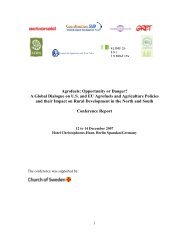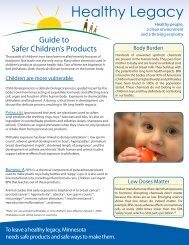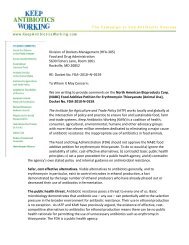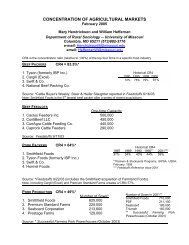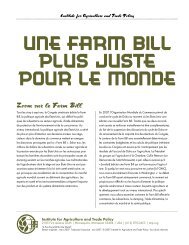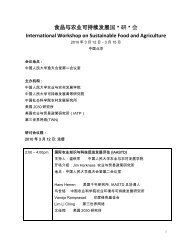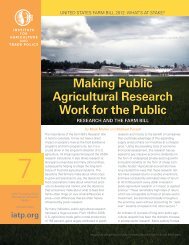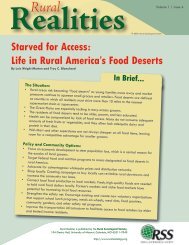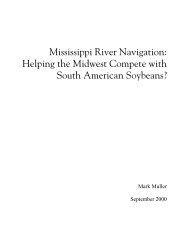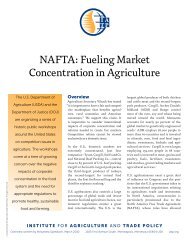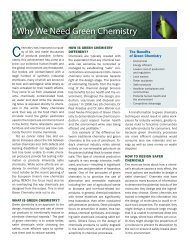A “How-to” Guide for Hosting Mini Farmers' Markets - City of ...
A “How-to” Guide for Hosting Mini Farmers' Markets - City of ...
A “How-to” Guide for Hosting Mini Farmers' Markets - City of ...
Create successful ePaper yourself
Turn your PDF publications into a flip-book with our unique Google optimized e-Paper software.
A <strong>“How</strong>-<strong>to”</strong> <strong>Guide</strong> <strong>for</strong><br />
<strong>Hosting</strong> <strong>Mini</strong> Farmers’<br />
<strong>Markets</strong> in Minneapolis
Foreword<br />
To increase access to healthy foods in low-income neighborhoods,<br />
the <strong>City</strong> <strong>of</strong> Minneapolis instituted a streamlined permitting process<br />
<strong>for</strong> small farmers’ markets. This initiative makes it easier and less<br />
expensive <strong>for</strong> organizations to bring fresh and af<strong>for</strong>dable produce to<br />
their neighborhoods. The following manual has been developed by<br />
the Institute <strong>for</strong> Agriculture and Trade Policy (IATP) with the support<br />
<strong>of</strong> Steps to a Healthier Minneapolis to guide interested organizations<br />
through the process <strong>of</strong> establishing successful mini markets to serve<br />
members <strong>of</strong> their communities.<br />
Institute <strong>for</strong> Agriculture and Trade Policy<br />
2105 First Avenue South<br />
Minneapolis, MN 55404<br />
http://www.iatp.org<br />
Steps to a Healthier Minneapolis<br />
250 South 4th Street, Room 510<br />
Minneapolis, MN 55415<br />
http://www.ci.minneapolis.mn.us/<br />
1
Table <strong>of</strong> Contents<br />
What is a mini market?........................................................................ 5<br />
What are the benefits <strong>of</strong> a mini market?.............................................. 9<br />
What do mini market host organizations need to know about city<br />
licensing and other requirements?................................................. 13<br />
What do mini market hosts and farmers need to know about the<br />
Farmers’ Market Nutrition Program (FMNP)?................................. 19<br />
What are the responsibilities <strong>of</strong> the mini market host organization<br />
and the farmers who sell at the mini markets?............................... 25<br />
When and where should we hold our mini market?........................... 29<br />
How do we find farmers to sell at our mini market?........................... 33<br />
What do we do once we’ve found our farmers?................................. 37<br />
How can we promote our mini market to people in our<br />
neighborhood?............................................................................... 41<br />
Connecting with food shelves: Ways to make fresh, local food<br />
even more available in your neighborhood.................................... 45<br />
3
What is a mini market?<br />
5
What is a<br />
mini market?<br />
• A mini market (or “local produce market”) is a small farmers’ market<br />
that has five or fewer farmers who sell their own locally grown<br />
produce and flowers.<br />
• The mini market concept was developed, in the summer <strong>of</strong> 2005,<br />
with the dual goals <strong>of</strong> increasing access to healthy foods and<br />
supporting local farmers.<br />
• <strong>Mini</strong> markets are generally located in low-income neighborhoods<br />
with limited access to healthy foods, especially fresh produce.<br />
• <strong>Mini</strong> markets fall under a 2009 <strong>City</strong> <strong>of</strong> Minneapolis policy that allows<br />
small produce markets to function with only a permit rather than<br />
a business license. This greatly reduces the time and expense <strong>of</strong><br />
setting up a new farmers’<br />
market. Please note: permit<br />
will be printed on a standard<br />
licensing certificate.<br />
• The <strong>City</strong> <strong>of</strong> Minneapolis also<br />
refers to mini markets as<br />
“Local Produce <strong>Markets</strong>.”<br />
The permit required <strong>for</strong><br />
a mini market is a “Local<br />
Produce Market” permit.<br />
• <strong>Mini</strong> markets are usually hosted by community organizations and<br />
can be held at any location in Minneapolis that complies with<br />
the health and zoning codes <strong>for</strong> locations with food sales. Any<br />
organization can host a mini market in their community.<br />
• Because the Local Produce Market permit is specific to the city <strong>of</strong><br />
Minneapolis, the mini markets as described in this “how-<strong>to”</strong> guide<br />
can operate only in Minneapolis. Other municipalities should contact<br />
their own licensing department to determine their options <strong>for</strong> starting<br />
a mini market.<br />
What is not a mini market?<br />
• Any farmers’ market that has more than five farmers, sells “valueadded”<br />
products such as bread or salsa, or <strong>of</strong>fers arts and crafts,<br />
etc., is considered a regular farmers’ market and requires a<br />
business license. The business license process costs approximately<br />
$450 the first year, with a $170 annual renewal fee. Fees are subject<br />
to change every year.<br />
If you are interested in hosting a regular farmers’ market, rather than<br />
a mini market, please visit: http://www.ci.minneapolis.mn.us/businesslicensing/food/index.asp.<br />
7
What are the benefits<br />
<strong>of</strong> a mini market?<br />
9
What are the benefits<br />
<strong>of</strong> a mini market?<br />
<strong>Mini</strong> markets are a low-cost way to bring healthy, local produce into<br />
any neighborhood. Like other farmers’ markets, mini markets provide<br />
a number <strong>of</strong> community benefits. They:<br />
• build a sense <strong>of</strong> community<br />
• support the local economy<br />
• provide healthy food options<br />
• connect people with farmers who grow food<br />
<strong>Mini</strong> markets also provide additional benefits that might not be realized<br />
with a larger farmers’ market. For example:<br />
• <strong>Mini</strong> markets are less<br />
expensive and easier to<br />
organize than a larger<br />
farmers’ market, making it<br />
possible <strong>for</strong> organizations<br />
and neighborhoods that<br />
cannot support a larger<br />
market to have a farmers’<br />
market.<br />
• <strong>Mini</strong> markets can choose not<br />
to have membership fees or<br />
rental fees <strong>for</strong> participating<br />
farmers, which gives farmers<br />
who might not be able to sell<br />
at a larger farmers’ market<br />
the opportunity to sell at a<br />
mini market.<br />
• <strong>Mini</strong> markets can be authorized by the Minnesota Department <strong>of</strong><br />
Agriculture to accept Farmers’ Market Nutrition Program (FMNP)<br />
food assistance coupons. FMNP coupons can only be used at<br />
farmers’ markets, but many FMNP recipients lack transportation<br />
to Minneapolis’ major markets. By locating in areas with high<br />
participation in food assistance programs, mini markets help<br />
ensure that people can use their FMNP coupons (See page 21 <strong>for</strong><br />
more about FMNP).<br />
11
What do mini market<br />
host organizations<br />
need to know about<br />
city permitting and<br />
other requirements?<br />
13
What do mini market<br />
host organizations<br />
need to know about<br />
city permitting and<br />
other requirements?<br />
• <strong>Mini</strong> markets are permitted and regulated by the <strong>City</strong> <strong>of</strong> Minneapolis.<br />
• <strong>Mini</strong> markets fall under a 2009 <strong>City</strong> <strong>of</strong> Minneapolis policy that<br />
allows small produce markets to function with a permit rather than<br />
a business license. The permit is called a “Local Produce Market”<br />
permit.<br />
• As <strong>of</strong> 2009, the permitting process <strong>for</strong> a mini market costs $158<br />
the first year and is free thereafter as long as there are no major<br />
changes to the market.<br />
• The permit allows mini<br />
markets to have a<br />
maximum <strong>of</strong> five farmers<br />
who sell only their own<br />
locally grown produce and<br />
flowers.<br />
• There are several <strong>for</strong>ms<br />
that must be completed to<br />
ensure that both your mini<br />
market and your farmers<br />
are allowed to operate.<br />
Forms <strong>for</strong> the mini market manager to complete:<br />
• Local Produce Market Permit application<br />
• The mini market manager must fill out a <strong>City</strong> <strong>of</strong> Minneapolis<br />
Local Produce Market Permit application and associated<br />
paperwork and submit them to the address listed on the<br />
application.<br />
• The Local Produce Market Permit application can be obtained<br />
through the <strong>City</strong> <strong>of</strong> Minneapolis’ Development Review Office:<br />
http://www.ci.minneapolis.mn.us/business-licensing/food/index.<br />
asp<br />
• Upon review <strong>of</strong> the application, the market manager will receive<br />
a Local Produce Market permit from the <strong>City</strong> <strong>of</strong> Minneapolis.<br />
• It is highly recommended that the mini market host organization<br />
in<strong>for</strong>m their insurance carrier about their mini market and add the<br />
mini market to their policy.<br />
• It is also highly recommended that your mini market be authorized<br />
to accept Farmers’ Market Nutrition Program (FMNP) coupons.<br />
See page 21 <strong>for</strong> FMNP in<strong>for</strong>mation.<br />
15
Forms <strong>for</strong> the mini market manager to collect from farmers:<br />
• The <strong>Mini</strong> Market Vendor Packet describes market rules and<br />
regulations and includes several <strong>for</strong>ms that farmers must<br />
complete and submit to the mini market manager:<br />
• <strong>Mini</strong> market<br />
application <strong>for</strong>m.<br />
• It is required<br />
by the State <strong>of</strong><br />
Minnesota <strong>for</strong><br />
farmers to complete<br />
a Minnesota<br />
Department <strong>of</strong><br />
Revenue ST19 tax<br />
<strong>for</strong>m.<br />
• Pro<strong>of</strong> <strong>of</strong> liability<br />
insurance is recommended.<br />
• The mini market manager must keep these <strong>for</strong>ms on file.<br />
• For 2009, the <strong>Mini</strong> Market Vendor Packet can be obtained from<br />
the Local Food Organizer at IATP: (612) 870-0453. <strong>Mini</strong> market<br />
managers may alter the packet as desired.<br />
Forms <strong>for</strong> farmers to complete:<br />
• Farmer’s Licensing Exemption Form<br />
• Farmers must be registered to sell in the <strong>City</strong> <strong>of</strong> Minneapolis.<br />
Farmers selling only produce that they have grown and<br />
harvested themselves are exempt from licensing requirements;<br />
however, they must complete the “Farmer’s Licensing<br />
Exemption Form” found at http://www.ci.minneapolis.mn.us/<br />
business-licensing/food/index.asp and submit it to the address<br />
listed on the <strong>for</strong>m.<br />
• The Farmer’s Licensing Exemption Form can be obtained from<br />
the <strong>City</strong> <strong>of</strong> Minneapolis’ Department <strong>of</strong> Environmental Health:<br />
http://www.ci.minneapolis.mn.us/business-licensing/food/index.<br />
asp.<br />
• Farmers only need to complete one Farmer’s Licensing<br />
Exemption Form per year, even if they sell at multiple farmers'<br />
markets. The farmers must in<strong>for</strong>m the mini market manager <strong>of</strong><br />
the location(s) at which they are selling.<br />
16
Other in<strong>for</strong>mation:<br />
• <strong>City</strong> <strong>of</strong> Minneapolis personnel may inspect mini markets to ensure<br />
that health codes are being followed.<br />
• If your market is authorized to accept Farmers’ Market Nutrition<br />
Program (FMNP) coupons, the Minnesota Department <strong>of</strong><br />
Agriculture may visit your market to ensure that farmers are<br />
complying with the FMNP rules (See page 21 <strong>for</strong> FMNP<br />
in<strong>for</strong>mation).<br />
17
What do mini market<br />
hosts and farmers<br />
need to know about<br />
the Farmers’ Market<br />
Nutrition Program<br />
(FMNP)?<br />
19
What do mini market<br />
hosts and farmers<br />
need to know about<br />
the Farmers’ Market<br />
Nutrition Program<br />
(FMNP)?<br />
The Farmers’ Market Nutrition Program (FMNP) is a national program<br />
through WIC (Women, Infants and Children) and NAPS (Nutrition<br />
Assistance Program <strong>for</strong> Seniors). It is designed to improve the diets <strong>of</strong><br />
low-income, nutritionally-at-risk children, pregnant women and seniors<br />
and to expand the use <strong>of</strong> farmers’ markets.<br />
FMNP participants in Minnesota receive $20 per year to be used at<br />
farmers’ markets. This money comes in the <strong>for</strong>m <strong>of</strong> five $4.00 FMNP<br />
“coupons” that act as checks. FMNP coupons can only be used at<br />
farmers’ markets that are authorized to accept them.<br />
It is highly recommended that your mini market be authorized to accept<br />
FMNP coupons. In past years, FMNP coupons have made up more<br />
than half <strong>of</strong> the sales at some <strong>of</strong> the mini markets. They also enable<br />
people to visit your market who might not otherwise be able to do so.<br />
The Federal and<br />
state rules about<br />
FMNP coupons are<br />
a little tricky. Both<br />
the farmers’ market<br />
as a whole and the<br />
individual farmers<br />
must be authorized<br />
to accept FMNP<br />
coupons.<br />
<strong>Mini</strong> market hosts<br />
are only responsible<br />
<strong>for</strong> making sure their<br />
market is FMNPauthorized.<br />
Farmers<br />
arrange their own<br />
FMNP authorization. These are explained separately below.<br />
Market authorization<br />
• According to Federal law, a farmers’ market must have a minimum<br />
<strong>of</strong> five FMNP-authorized farmers in order to accept FMNP coupons.<br />
• Most mini-markets do not have five FMNP-authorized farmers.<br />
However, the mini-markets together can be authorized under<br />
the umbrella <strong>of</strong> the "<strong>Mini</strong>-market Project". For the 2009 market<br />
season, the Institute <strong>for</strong> Agriculture and Trade Policy (IATP) is<br />
acting as an umbrella organization <strong>for</strong> markets that choose to seek<br />
FMNP authorization. If you want your mini market to be included<br />
under the “<strong>Mini</strong> Market Project” umbrella, please contact the Local<br />
Food Organizer at IATP: (612) 870-0453.<br />
21
• If your mini market is FMNP-authorized, you must have at least<br />
one FMNP-authorized vendor present at all times, so that FMNP<br />
recipients can redeem their coupons.<br />
• FMNP authorization is free.<br />
Vendor authorization<br />
• In order to be able to accept FMNP coupons, individual farmers<br />
must also be FMNP-authorized.<br />
• Many farmers who sell at farmers’ markets are already FMNPauthorized.<br />
• Farmers arrange their<br />
own FMNP authorization.<br />
To become authorized, a<br />
vendor needs to attend<br />
a training held by the<br />
Minnesota Department<br />
<strong>of</strong> Agriculture. For more<br />
in<strong>for</strong>mation about vendor<br />
authorization, see http://<br />
www.mda.state.mn.us/<br />
food/business/fmnp.htm.<br />
• FMNP-authorized farmers<br />
can only accept FMNP<br />
coupons at FMNP-authorized markets.<br />
• FMNP authorization is valid as long as the vendor continues<br />
to sell at an FMNP-authorized market and is not cited <strong>for</strong> noncompliance.<br />
It is not necessary <strong>for</strong> a vendor to “renew” FMNP<br />
authorization.<br />
Farmers receive a manual at the FMNP training detailing their<br />
responsibilities as an FMNP-authorized vendor. It is the farmers’<br />
responsibility to comply with all <strong>of</strong> the FMNP rules. However, mini<br />
market managers can help make sure they are doing so. In particular,<br />
it is good <strong>for</strong> the market managers to know that:<br />
• Farmers’ pink “FMNP Checks Welcome Here” sign must be visible<br />
at their booth at all times.<br />
• Farmers cannot make change <strong>for</strong> FMNP coupons. If a customer<br />
tries to pay <strong>for</strong> less than $4.00 worth <strong>of</strong> produce with an FMNP<br />
coupon, the vendor must work with them to provide a full $4.00<br />
worth <strong>of</strong> produce.<br />
22
• FMNP coupons must be signed by the customer at time <strong>of</strong><br />
purchase. Farmers cannot accept pre-signed coupons.<br />
• FMNP coupons can only be used to purchase fresh vegetables,<br />
fruits and herbs.<br />
• To ensure that farmers do not charge more <strong>for</strong> FMNP coupon<br />
purchases than <strong>for</strong> cash purchases, farmers must have the price<br />
<strong>of</strong> their produce prominently displayed.<br />
The Minnesota Department <strong>of</strong> Agriculture occasionally visits the<br />
markets to ensure compliance with the FMNP rules. If a vendor<br />
is found violating any <strong>of</strong> the above guidelines, the Minnesota<br />
Department <strong>of</strong> Agriculture may cite the vendor <strong>for</strong> non-compliance.<br />
Consequently, farmers will have to attend the FMNP training the<br />
following year to become reauthorized.<br />
23
What are the<br />
responsibilities <strong>of</strong><br />
the mini market host<br />
organization and the<br />
farmers who sell at<br />
the mini markets?<br />
25
What are the<br />
responsibilities <strong>of</strong><br />
the mini market host<br />
organization and the<br />
farmers who sell at<br />
the mini markets?<br />
<strong>Mini</strong> market host organization:<br />
<strong>Mini</strong> markets are hosted and coordinated by community organizations.<br />
The host organization:<br />
• Provides the space<br />
<strong>for</strong> the market.<br />
• Provides oversight<br />
<strong>of</strong> the market.<br />
• Identifies a staff<br />
person to serve<br />
as the mini market<br />
manager.<br />
The mini market manager is responsible <strong>for</strong> the day-to-day operation<br />
<strong>of</strong> the market. The mini market manager’s responsibilities are to:<br />
• Commit to being at the market each week while the market is in<br />
operation.<br />
• Recruit farmers to sell at the market. See page 34 <strong>for</strong> in<strong>for</strong>mation<br />
about finding farmers.<br />
• Complete the <strong>City</strong> <strong>of</strong> Minneapolis Local Produce Market Permit<br />
application and associated paperwork and submit them to the <strong>City</strong>.<br />
See page 15 <strong>for</strong> permit in<strong>for</strong>mation.<br />
• Have farmers fill out the <strong>for</strong>ms in the <strong>Mini</strong> Market Vendor Packet<br />
and submit them to the mini market manager, who must keep<br />
these <strong>for</strong>ms on file. See page 16 <strong>for</strong> in<strong>for</strong>mation about the vendor<br />
packet.<br />
• Build a relationship with the property owner <strong>of</strong> the market site<br />
(if other than the mini market host organization).<br />
• Build relationships and maintain communications with the farmers<br />
who sell at your market.<br />
• Oversee the daily operation <strong>of</strong> the market, ensure health and<br />
safety, and maintain cleanliness.<br />
• Promote the market to the surrounding community. See page 42<br />
<strong>for</strong> promotion suggestions.<br />
• Connect with a local food shelf and encourage farmers to donate<br />
unsold product. See page 47 <strong>for</strong> food shelf in<strong>for</strong>mation.<br />
• Secure Farmers’ Market Nutrition Program (FMNP) authorization<br />
<strong>for</strong> the market. This is not required. See page 21 <strong>for</strong> FMNP<br />
in<strong>for</strong>mation.<br />
27
Farmers:<br />
• Be registered to sell produce in Minneapolis. See page 16 <strong>for</strong><br />
registration in<strong>for</strong>mation.<br />
• Fill out the <strong>for</strong>ms in the <strong>Mini</strong> Market Vendor Packet and submit<br />
them to the mini market manager. See page 16 <strong>for</strong> in<strong>for</strong>mation<br />
about the vendor packet.<br />
• Bring tables,<br />
tents, and all<br />
other materials<br />
needed to sell at<br />
the market.<br />
• Commit to<br />
selling weekly<br />
<strong>for</strong> the whole<br />
market season<br />
(generally late<br />
June through<br />
late September).<br />
• Contact mini market manager in advance if unable to attend a<br />
market.<br />
• Be authorized to accept Farmers’ Market Nutrition Program<br />
(FMNP) coupons. Not all farmers need to be authorized.<br />
(See page 21 <strong>for</strong> FMNP in<strong>for</strong>mation).<br />
• Donate unsold produce to a food shelf if asked. See page 46 <strong>for</strong><br />
food shelf in<strong>for</strong>mation.<br />
28
When and where<br />
should we hold<br />
our mini market?<br />
29
When and where<br />
should we hold our<br />
mini market?<br />
Market Dates:<br />
• Because mini markets only sell locally grown fresh produce, the<br />
markets can only operate when this produce is available, typically<br />
between late June and late September.<br />
Market Times:<br />
• <strong>Mini</strong> markets generally last between two and four hours.<br />
• <strong>Mini</strong> markets can be held any time; however, an afternoon mini<br />
market is preferable because it allows farmers to sell at bigger<br />
farmers’ markets in the morning and then come to the mini<br />
markets afterwards.<br />
• If possible, try to coordinate your market with other activities in the<br />
neighborhood.<br />
Market Location:<br />
Regardless <strong>of</strong> where<br />
you hold your mini<br />
market, all markets<br />
must have zoning<br />
approval and are<br />
required to provide:<br />
• Access to a<br />
bathroom and<br />
hand-washing<br />
facility <strong>for</strong> farmers.<br />
• Access to a building and phone in case <strong>of</strong> emergency.<br />
• A 10’ x 10’ space on a “cleanable surface,” such as concrete or<br />
asphalt, <strong>for</strong> each vendor.<br />
• Prompt removal <strong>of</strong> all trash and debris within 100 feet <strong>of</strong> the mini<br />
market.<br />
You will also want to consider:<br />
• Amount <strong>of</strong> foot traffic in the area – more is better!<br />
• Visibility <strong>of</strong> the potential market site – again, more is better!<br />
• Availability <strong>of</strong> parking or accessibility via public transportation.<br />
• Remember that markets take place outdoors and are susceptible<br />
to changing weather. Farmers who sell in open-air markets will<br />
come prepared but make sure your market is in a location that<br />
shoppers will visit if it rains.<br />
31
Other things to keep in mind:<br />
Where and when you hold your mini market depends in part on the<br />
people you want your to serve. For example:<br />
• If your goal is to attract neighborhood residents on their way home<br />
from work, an early evening market near a busy street corner or a<br />
bus stop might be most appropriate.<br />
• If, on the other hand, your market is aimed primarily at the<br />
residents <strong>of</strong> a senior housing facility, a mid-afternoon market in an<br />
accessible location that is visible from the seniors’ apartments is<br />
recommended.<br />
Please note: if you<br />
decide to change<br />
the location <strong>of</strong><br />
your market,<br />
you will need to<br />
reapply and pay<br />
<strong>for</strong> a new permit<br />
as the new site<br />
must go through a<br />
zoning review.<br />
32
How do we find<br />
farmers to sell at<br />
our mini market?<br />
33
How do we find<br />
farmers to sell at<br />
our mini market?<br />
The mini market host organization is responsible <strong>for</strong> finding and<br />
coordinating with the farmers who will sell at your mini market.<br />
There are many ways you can find farmers to sell at your mini market:<br />
• Visit other farmers’ markets and talk to farmers in advance <strong>of</strong> your<br />
market opening date. Most <strong>of</strong> the bigger markets start in May or<br />
June.<br />
• Visit markets that operate on the same day as you want to hold<br />
your mini market. Many mini market farmers sell at the bigger<br />
farmers’ markets in the morning and then come to the mini<br />
markets in the afternoon. If the farmers are already in town <strong>for</strong><br />
another market, they are more likely to be available <strong>for</strong> your mini<br />
market.<br />
• Call farmers and<br />
organizations listed in<br />
the Minnesota Grown<br />
directory: http://www.<br />
mda.state.mn.us/<br />
food/minnesotagrown/<br />
directory.htm<br />
• Contact local<br />
agriculture<br />
organizations and farming groups to broadcast the opportunity to<br />
sell at your market.<br />
• Network with other mini markets that do not share your market<br />
day. Many <strong>of</strong> the farmers participate in more than one mini market.<br />
When talking to farmers:<br />
• Make sure your farmers can commit to being at your market each<br />
week <strong>for</strong> the entire market season. This will provide continuity and<br />
avoid surprises.<br />
• Make sure your farmers are licensed to sell at farmers’ markets in<br />
Minneapolis. See page 16 <strong>for</strong> vendor licensing in<strong>for</strong>mation.<br />
Make sure you recruit enough farmers <strong>for</strong> your mini market to take<br />
place even if one <strong>of</strong> the farmers can’t make it on a particular day.<br />
While you may only have a few farmers on a given day, it is best to<br />
build a roster <strong>of</strong> 4-5 farmers willing to sell at your market<br />
• If you want your mini market to be able to accept Farmers’ Market<br />
Nutrition Program (FMNP) coupons, ask the farmers if they are<br />
FMNP-certified. See page 21 <strong>for</strong> FMNP in<strong>for</strong>mation.<br />
35
What do we do<br />
once we’ve found<br />
our farmers?<br />
37
What do we do<br />
once we’ve found<br />
our farmers?<br />
Once you have found farmers to sell at your mini market, the mini<br />
market manager must:<br />
• Make sure the farmers complete the <strong>for</strong>ms in the <strong>Mini</strong> Market<br />
Vendor Packet and submit them to the mini market manager. See<br />
page 16 <strong>for</strong> in<strong>for</strong>mation about the vendor packet.<br />
• Establish guidelines <strong>for</strong> contact in case a farmer cannot make it to<br />
the market or a market needs to be cancelled.<br />
• Call your farmers a few weeks be<strong>for</strong>e the market starts to confirm<br />
that they will be there.<br />
• Meet your farmers in person be<strong>for</strong>e your market starts. This will<br />
help you develop a relationship with your farmers, allow you to<br />
answer any questions you may have <strong>for</strong> each other, and help<br />
avoid any confusion on the first day <strong>of</strong> your market.<br />
• Make sure your farmers feel welcome and appreciated at your<br />
market. You want them to have a positive experience and to come<br />
back each week – and hopefully even next year.<br />
• Remember that farmers sell produce as a livelihood. One <strong>of</strong> the<br />
best things you can do <strong>for</strong> farmers is to create a lively environment<br />
with lots <strong>of</strong> customers!<br />
39
How can we<br />
promote our mini<br />
market to people in<br />
our neighborhood?<br />
41
How can we<br />
promote our mini<br />
market to people in<br />
our neighborhood?<br />
Think <strong>of</strong> your mini market like any other community activity, such as<br />
a garage sale or neighborhood festival. Get the word out in as many<br />
ways as possible! For example:<br />
• Make lawn signs to put around the neighborhood.<br />
• Distribute flyers throughout neighborhood. For example, post<br />
flyers on public bulletin boards at libraries, community centers and<br />
c<strong>of</strong>fee shops.<br />
• Ask nearby businesses and housing facilities if they can advertise<br />
the market to their customers and tenants such as placing premade<br />
flyers in their windows.<br />
• Submit short articles or ads to your neighborhood or<br />
organizational newsletter, newspaper or website. Don’t <strong>for</strong>get to<br />
include the dates, times and location <strong>of</strong> the market!<br />
• Promote your market<br />
at other neighborhood<br />
events such as a festival,<br />
block party, etc.<br />
• Encourage nearby<br />
restaurants to buy from<br />
the mini market.<br />
• Advertise at local WIC<br />
clinics.<br />
• Invite friends to visit the market with you!<br />
Other important things to consider when promoting your market:<br />
• Be sure that any signs, flyers, etc. are written in the languages<br />
spoken in your neighborhood.<br />
• Keep promoting your market throughout the summer, not just<br />
be<strong>for</strong>e it starts.<br />
• Make sure your market takes place every week during the period<br />
you announce. Customers will come back if they know they can<br />
rely on it.<br />
As time goes by, your customer base will grow. Once people know the<br />
market is there and visiting the market becomes part <strong>of</strong> their routine,<br />
they will come more regularly – and hopefully tell their friends and<br />
family to come as well!<br />
43
Connecting with<br />
food shelves: Ways<br />
to make fresh, local<br />
food even more<br />
available in your<br />
neighborhood<br />
45
Connecting with<br />
food shelves: Ways<br />
to make fresh, local<br />
food even more<br />
available in your<br />
neighborhood<br />
Food shelves rarely have fresh produce to give to their clients. At the<br />
same time, farmers selling at farmers’ markets <strong>of</strong>ten have high quality<br />
leftover produce that did not sell. Some farmers may be willing to<br />
donate this leftover produce to a nearby food shelf, which is a taxdeductible<br />
donation <strong>for</strong> the farmer.<br />
As a mini market host, you can help make this possible by:<br />
• Connecting with a food shelf in your neighborhood. Community<br />
centers, places <strong>of</strong> worship and social service organizations <strong>of</strong>ten<br />
have a food shelf or can tell you where to find one.<br />
• Making arrangements <strong>for</strong> transporting the produce to the food<br />
shelf ahead <strong>of</strong> time. The mini market manager is responsible <strong>for</strong><br />
making sure donated produce gets to the food shelf in a timely<br />
manner. Some food shelves may even pick up donations.<br />
The food shelf should provide a receipt <strong>for</strong> donations. <strong>Mini</strong> market<br />
managers are asked to keep these receipts and track the total number<br />
<strong>of</strong> pounds donated each year.<br />
47


